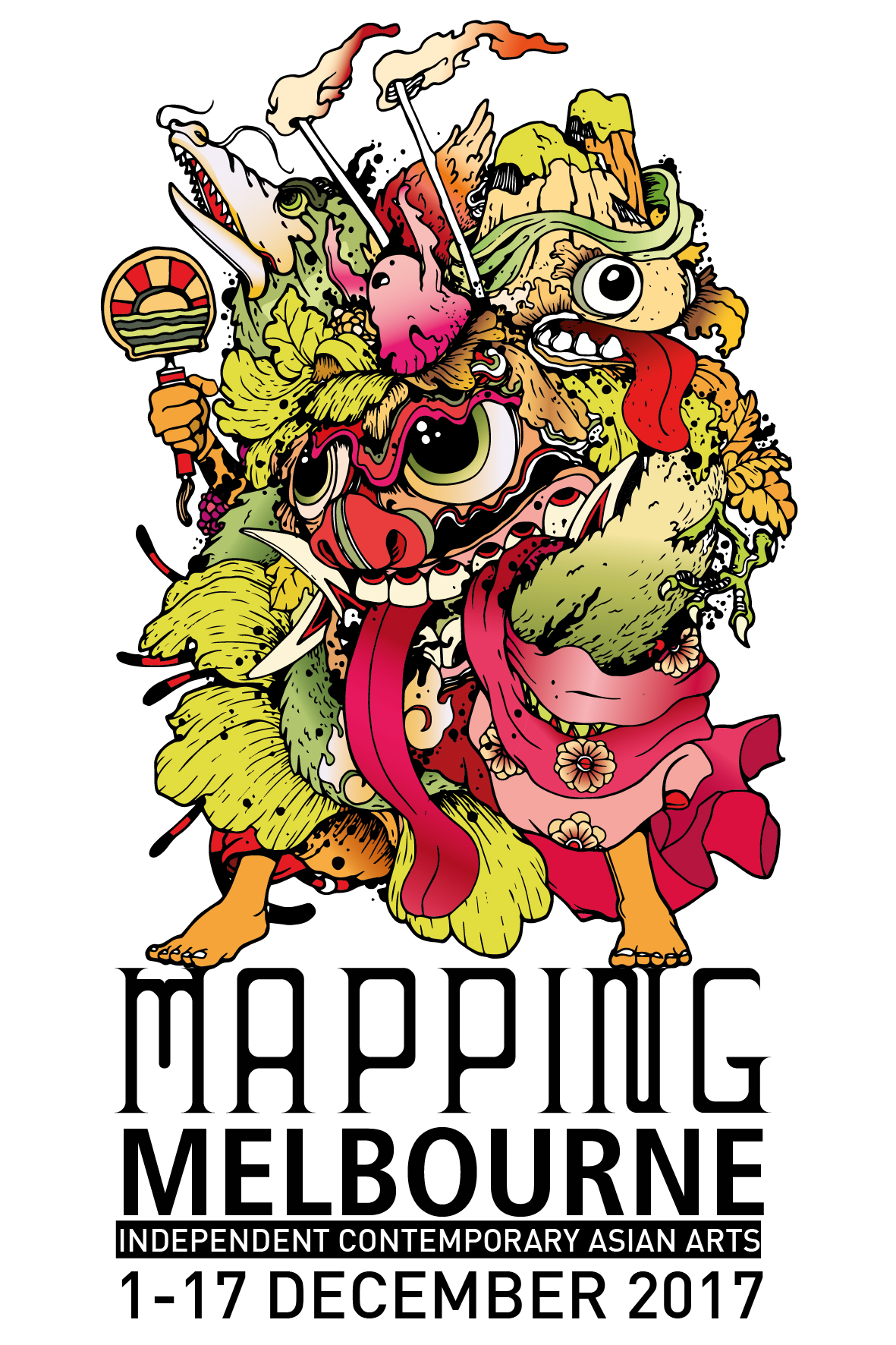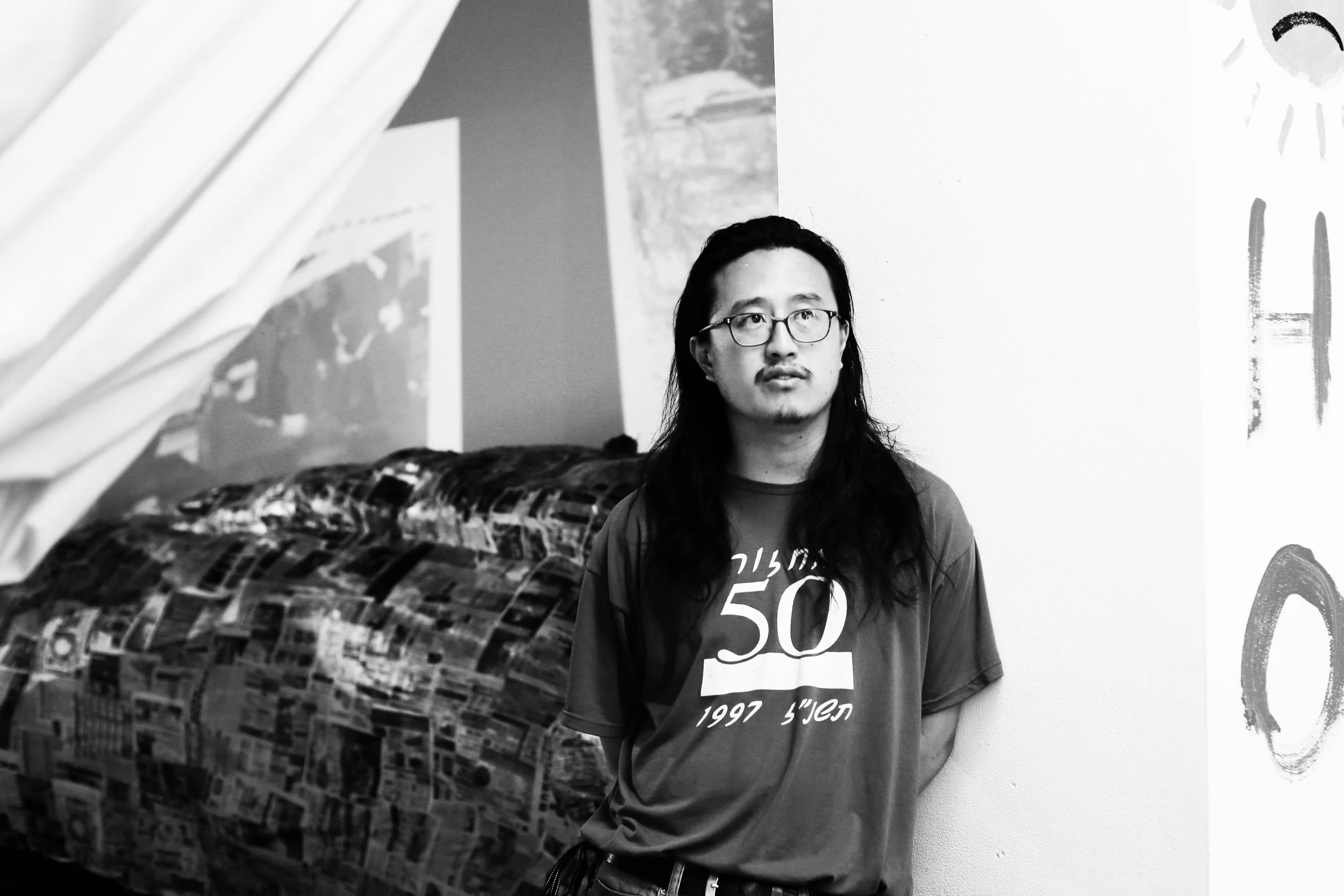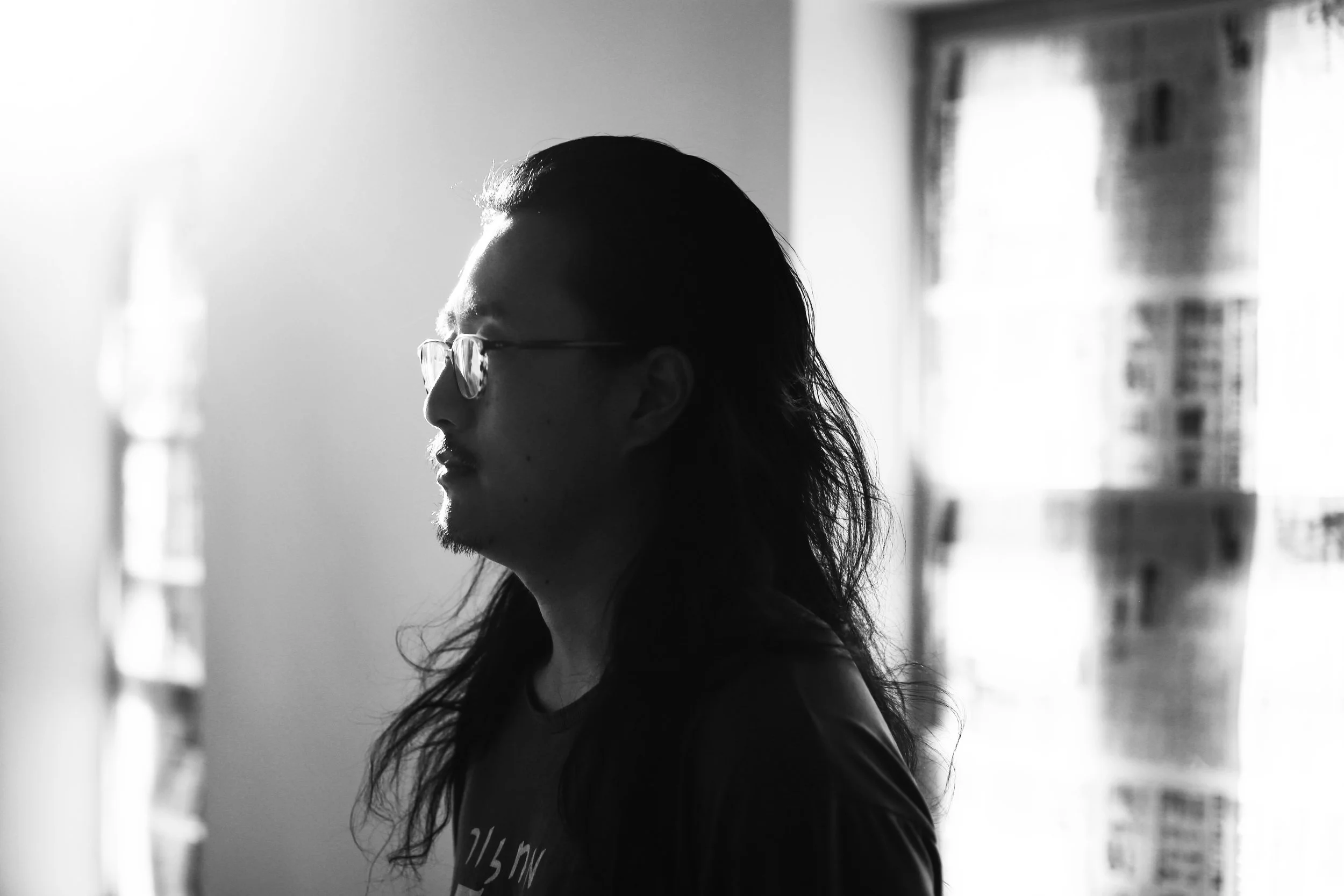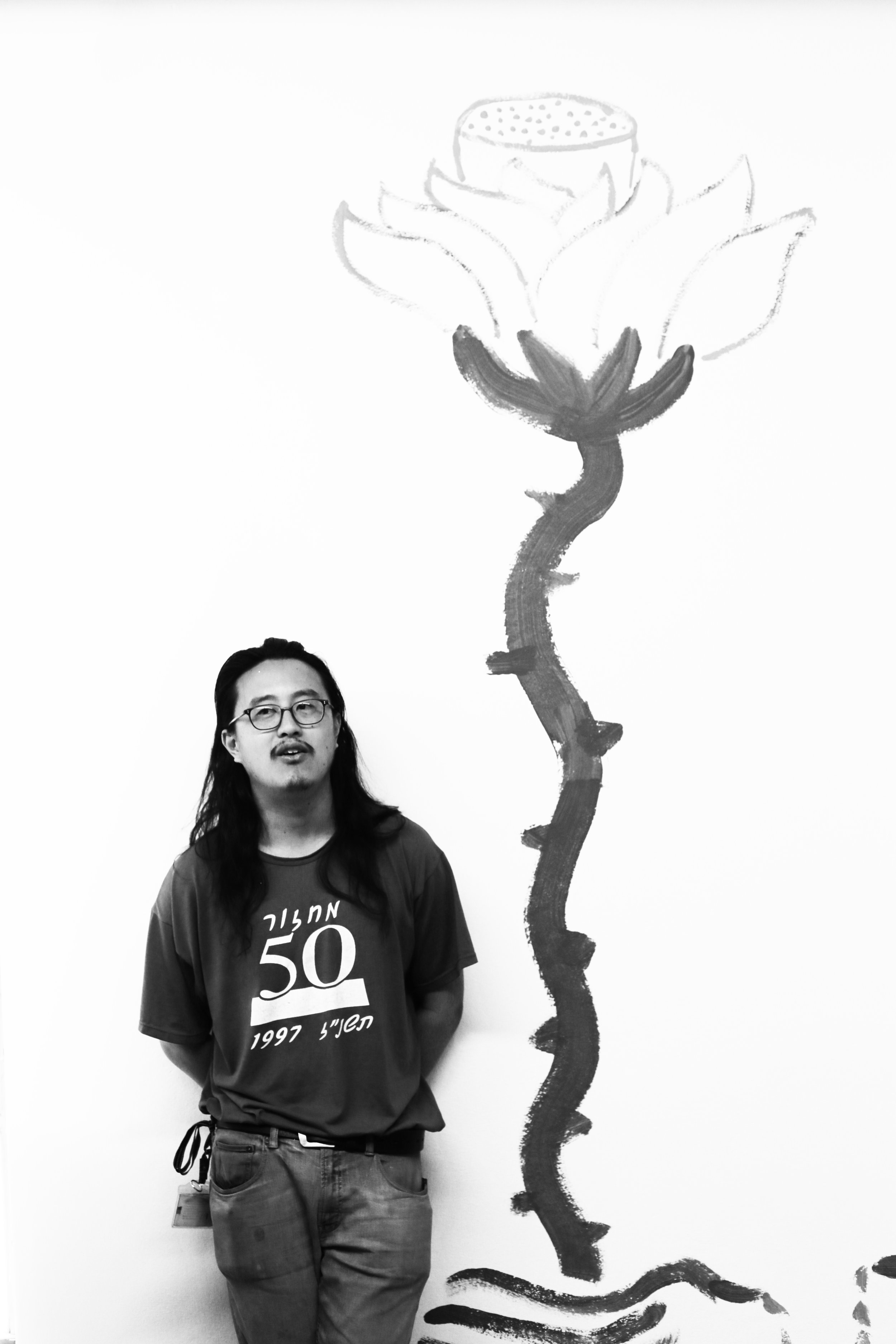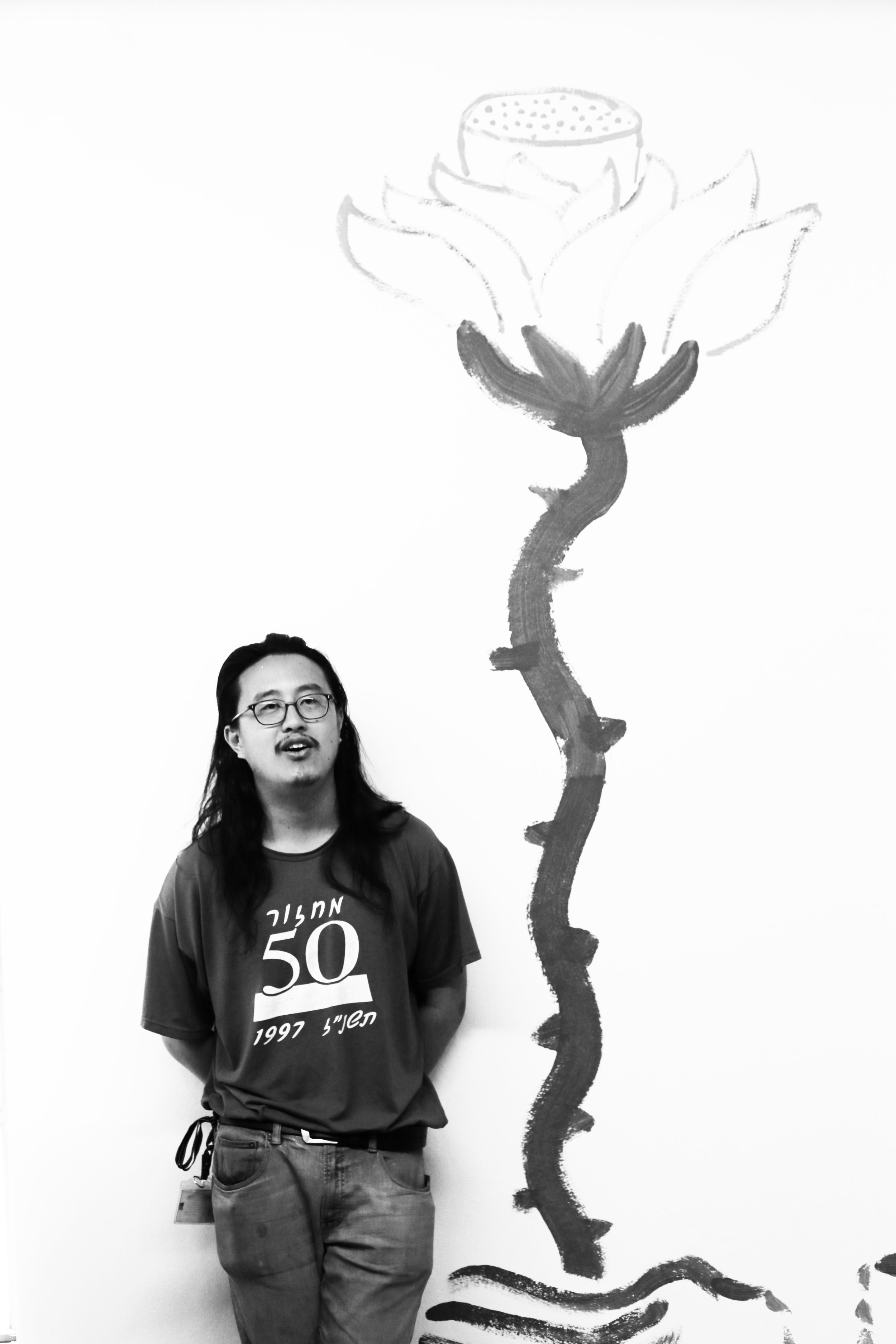Interview #34 — Jason Phu
by Sophia Cai
Jason Phu was born in 1989 in Sydney. He has presented numerous solo exhibitions across Australia, including at Nicholas Projects, CCAS Gorman Arts Centre, Alaska Projects and Ray Hughes Gallery. His most recent exhibition, My Parents Met at the Fish Markets, is currently showing at West Space.
Jason speaks to Sophia Cai about about mistranslation as truth, writing love poems to no one, and avoiding self-orientalisation.
This interview has been created in partnership with Multicultural Arts Victoria for Mapping Melbourne. Alongside his exhibition at West Space, Jason will run a free one-day Chinese painting workshop, celebrating the medium of ink with calligraphic brushes on Chinese xuan paper. Book here.
How did you decide to be an artist? Is this something you have always wanted to do?
I was always doodling and drawing cartoons as a kid, much like a lot of other kids. It wasn’t until high school that I considered being a designer and was tossing up between that and engineering, which I did as a subject and really enjoyed. One of my art teachers told me that I should consider fine arts. My perception of artists back then was much like the public perception of being poor and unsuccessful until after you died (which obviously has a lot of truth as well) but he said that if I made sure I worked really hard I could make a career out of it.
Although this sounds a bit silly about working hard, I do think this is a genuine but simple thing that is often ignored. A lot of my peers later in art school struggled to hand in assignments that were like do a drawing of a chair or some simple task. I was always that art nerd that would do ten drawings instead of the one required. Don't get me wrong, I still handed things in late and was incredibly lazy in a lot of aspects, but I had this huge thirst to make art that seemed like a burden to a lot of people.
I ended up not getting the grades to get into Visual Communication and Engineering (because I didn’t work very hard, haha) and studied Fine Arts instead. My parents were a little disappointed but my dad said to me, "no matter what you do as long as you work hard we'll support you decision."
That story sounds similar to what my parents said when I decided to study art history. Where did you end up studying?
I studied a Bachelor of Fine Arts graduating with honours, majoring in printmaking at COFA (now UNSW Art & Design) in Sydney. During that time I spent a semester at Nova Scotia College of Art and Design, studying lithography, and a winter at The Central Academy of Fine Arts in Beijing studying etching and Chinese painting. I started my Masters but gave up and moved to Chongqing, China for two years.
One of the most immediate things in your work is the use of humour to reflect on aspects of your personal and daily life. How autobiographical are your works— do you take some artistic liberties in the way you approach these topics?
Yes, they are all the truth in their own way. I have a little scar on my chin I got when I was three, my father told me I got it because I had chicken pox and scratched it into a scar. My mum told me I was standing on top of a table and yelled I’m the king of the world! and jumped.
Your current solo exhibition at West Space is perhaps one of your most ambitious projects to date. Can you tell me a bit more about the ideas behind the show, and how it came to be developed?
The title of the exhibition came from my own personal life, and tells the story of how my parents met. For me, this is a sort of genesis or starting point for my own narrative, and my exhibition at West Space is about using this initial encounter as a starting point to consider these topics.
I think there are particular ways that immigrant family stories are told, or particular versions of those stories are told. Stories are not always truthful and the memory is not always accurate. I grew up hearing these particular stories about my parents but there is no absolute truth, as they are tinged with nostalgia or potential trauma.
The exhibition is roughly divided into four sections—in my memories, in my dreams, in my nightmare and the real world is fish guts. The exhibition took nearly two weeks to install, and halfway through I flew down a friend from Sydney who is set designer to help me build aspects of the exhibition.
One of the key aspects in your work is the use of Chinese text and its mistranslation or miscommunication. In particular, your experience a first generation migrant who can speak Chinese but not read it. How do you explore this disparity in your works?
I actually learnt calligraphy in China, during one of my frequent visits to my mum’s side of the family. I wasn’t doing much during this time so my mother signed me up to calligraphy and martial arts classes as a way to keep me occupied.
During the two years I spent living and working in China I had thought about pursuing my formal calligraphy training—but all the artists there questioned why I wanted to have a teacher, and instead encouraged me to keep doing what I’m doing. In their words, 'you can’t unlearn something.'
In my eyes, mistranslation is a more truthful depiction. When my mum (a fluent reader/speaker in Chinese) reads the writing in my work she will point out things like ‘you spelt that wrong’ or ‘that doesn’t make grammatical sense’ but the whole point is that I wanted them that way. Or I might use Google Translate to work out how to say something.
Sometimes people who are native Chinese speakers will see my work in a gallery and tell gallery attendants or workers that they are ‘wrong’. Or they might think a four year old wrote the poems or works because of the extent of my vocabulary.
Rather than pretending I am a Chinese person who has studied the language, I think this approach is more truthful to my own perceptions and how I’ve come to use and learn Chinese. It’s truthful in showing my own skills and my experience. In this way I guess I am also fighting the perception of what Chinese Australian might mean, through the use of language.
Do you ever feel pigeonholed by identity politics? Does this get complicated by the fact that you often use ink and other ‘traditionally Chinese’ forms in your work?
I realised very early on the potential problems and immediately diversified my practise. However that being said, I do obviously use a lot of aspects of Chinese culture like the language and Daoist/Buddhist trinkets. It is a constant struggle to make sure I don’t self-orientalise myself and that I don’t behave like a Sinophile. I do not know if I’m successful or not but I try to be as truthful as possible.
In terms of my identity or my practice being pigeon-holed institutionally or internationally, it is part of a longer conversation I'm having with my mentors. I simply see it as part of my job as an artist, to navigate these things politically and to place myself in the right context. It doesn’t currently affect me but hopefully I will have the privilege of it affecting me soon. It feels like I am preparing for a tsunami with a piece of driftwood, but maybe I can find other bits of wood and make a boat.
What does being Asian-Australian mean to you?
Being Asian Australian means being not Asian+Australian, not a hybrid, not a mixture, not two halves of something. It is being asianaustralian, it is unique of what people might think as two halves. It is separate and frozen at the same time from whatever mainland it migrated from. It is moulded by its context but not defined by it.
Speaking of context, how has living and studying abroad shaped your art practice and perhaps also your sense of identity?
I think they were important experiences to realise that I don’t have to seek anything out to complete myself, and that I have all the tools necessary to navigate the undefinable aspects of my identity. When I went to Beijing recently my uncles said: ‘you're looking for something that doesn't exist.’ This doesn’t mean anything deep or meaningful, they literally were just saying chill out and eat some food and have a drink with us.
You are one of the artists participating in this year’s Mapping Melbourne, run by Multicultural Arts Victoria. Can you tell me a bit more about what you will do for this festival?
My project is aimed at younger audiences. I’ll be running a Chinese painting workshop similar to ones I’ve run before. It’s called 'Drawing A Jason Phu Joke' and involves a lot of jokes involving animals but also references from Chinese mythology, folklore and humour. These paintings in their childlike simplicity often look like Chan Buddhist paintings. The participants will also write the joke on the paper, and there will be some opportunities for them to translate them into Chinese characters. Sometimes I feel like the kids make better works than I do!
Text and writing are pivotal to your works—whether in your use of calligraphy or in the titles you give to your works (which can sometimes read like poems in themselves). Do you ever see yourself developing your writing and focusing on it as another aspect of your practice?
Yeah, I’m self-publishing a book of poetry at the end of the year. I also want to write a novel. I’ve never seen a piece of artwork that’s completely changed me emotionally, mentally or philosophically, but I’ve read countless books that have done that to me. I want to know what that is.
Can you tell me a bit more about your upcoming poetry collection, what can we expect to read?
They're love poems to no one. Not in any metaphorical way, literally they're for no one.
What are you currently reading?
I was an avid reader until I discovered Instagram. It really is a useless brain drain. I used to think it was an amazing resource (which it is in small doses), it was great seeing what Islamic and Japanese calligraphers are doing. I am taking a break from it. But right before that I was halfway through Death Fugue by Sheng Keyi, Here Come the Dogs by Omar Musa and The First Bad Man by Miranda July. I am also doing some light reading about Chinese Australian history and Chan Buddhist Monks teachings.
If you weren’t working as an artist what do you think you might be doing?
I think I might be a mechanical engineer, mathematician, cartoonist or denture technician.
Not a writer?
Nup.
Who are you inspired by? Who are some of your heroes?
Artists Lindy Lee and John Young, not just because of their practises but they paved the way for curators to understand Asian Australian identity in a more complex and less tokenistic manner. Others who inspire me include Haruki Murakami, Otagaki Rengetsu, Luo Ping, and Charles Bukowski.
What are you currently listening to?
Lots of Coltrane, Robert Johnson, Sade, Vietnamese nineties pop, Japanese Shamisen music, raw drum beats
How do you practice self-care?
Lie in a park and stare at the sky and pretend I am not an artist.
And lastly, do you have any advice for emerging artists?
Constantly question why you make art and who you make art for and if art really is necessary.
Find mentors or people that are critical of your art but also give relevant feedback for you to evolve. Respond to that feedback but also realise that it is just another viewpoint, but also if you're young don’t take that as your starting point, no one under 35 has enough life experience to make anything relevant.
Get off Instagram (coming from someone who uses it every day).
Support your community - the arts community is a small community and we have to stick together. I would not have had the successes I have had without the support of friends whether it's from a networking perspective or to just helping drive a truck. In popular media there is always the lone artist rising to the top, this is bullshit, no one gets to the top by themselves.
Jealousy and envy can be toxic things to the arts community. Celebrate your friend’s successes because they become your own.
Find out more
Interview by Sophia Cai
Photographs by Leah Jing McIntosh at West Space

